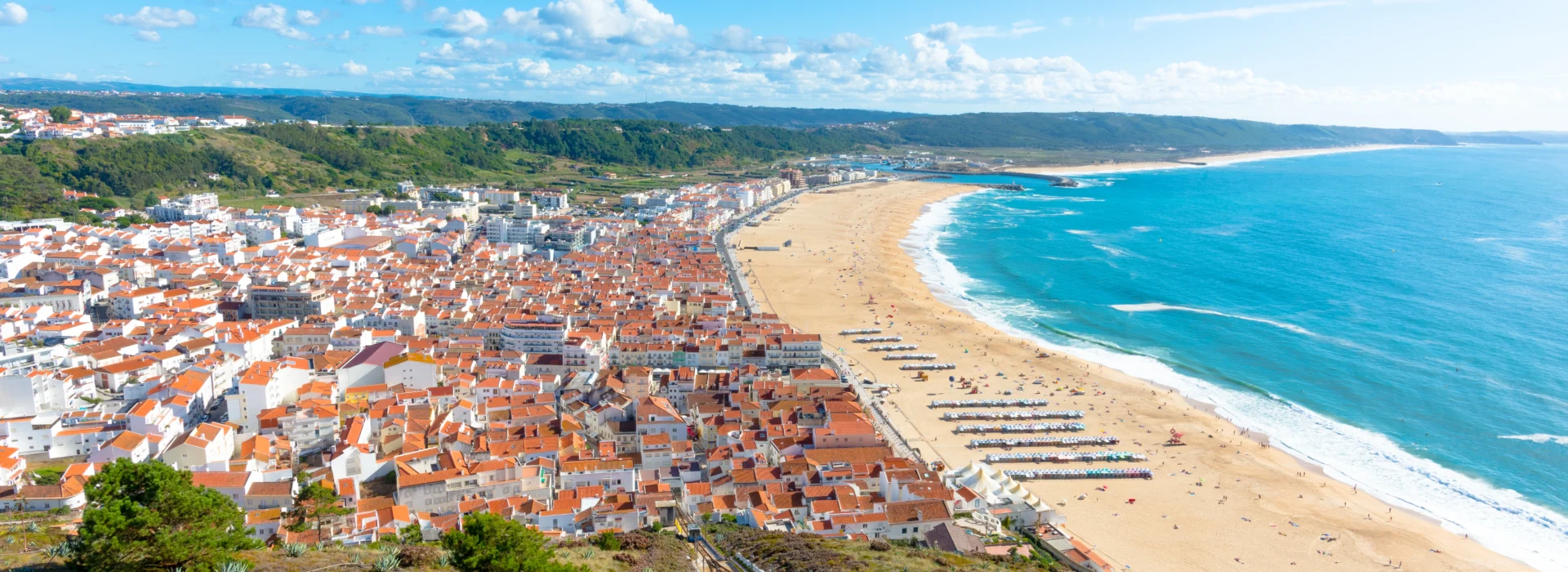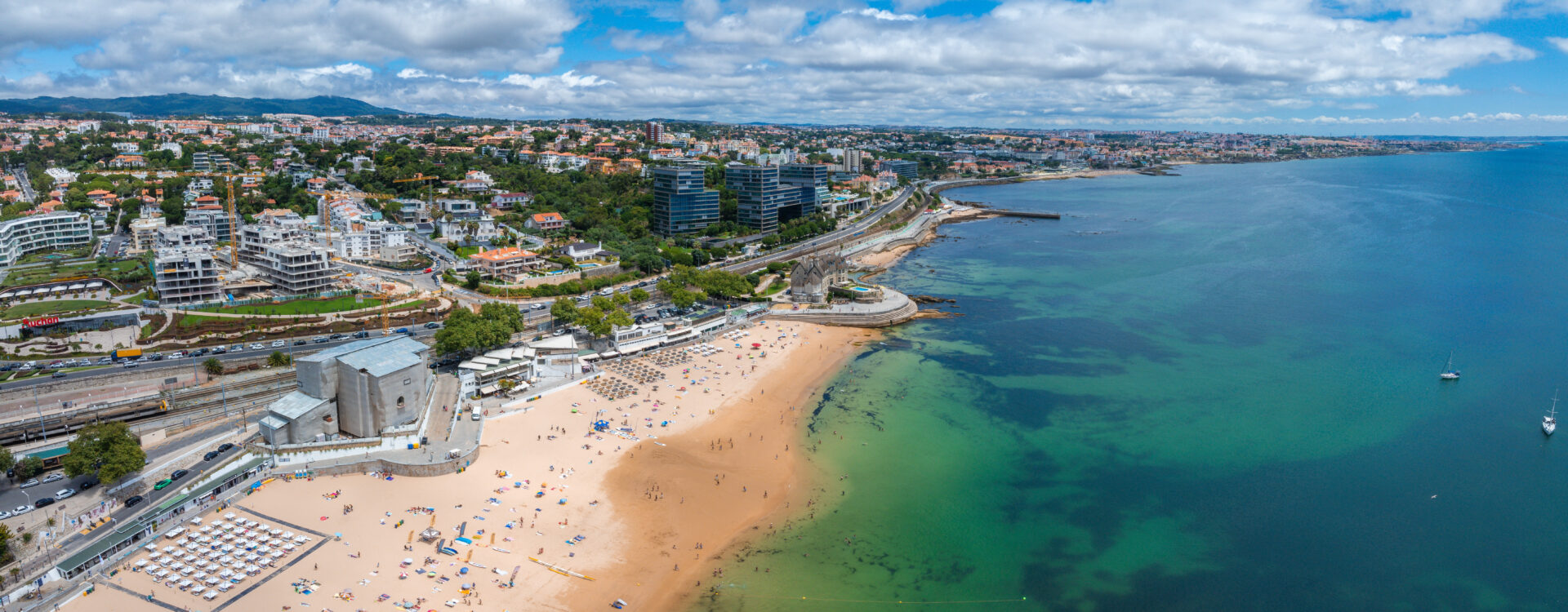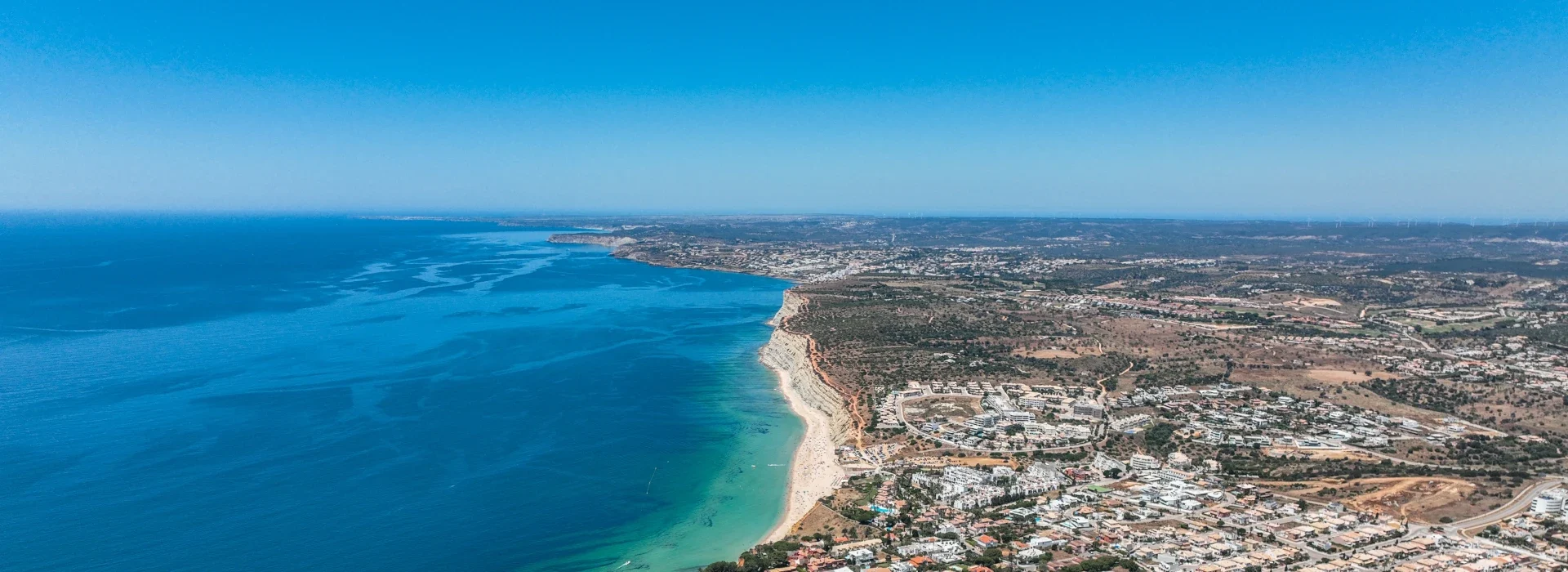Relocating to Portugal from the UK
Portugal has become a well-established choice for British citizens seeking a change in lifestyle, a mild climate, and a balanced cost of living. Whether you plan to retire, work remotely, or relocate for family reasons, the country offers stability, safety, and a high standard of everyday life.
Following the UK’s exit from the European Union, Portugal remains among the most straightforward destinations in Europe for British nationals. Residency and visa options are clearly defined, and well-connected British communities exist throughout the country. This guide outlines what you need to know when relocating from the UK to Portugal — from legal and financial considerations to housing, healthcare, and integration.
For a broader overview of life in Portugal, including practical information on housing, healthcare, education, and administrative procedures, see our Moving to Portugal guide.

Talk to our Team
Table of Contents
What’s Driving British Citizens to Relocate to Portugal?
Recent Migration Trends
Since the United Kingdom’s departure from the European Union, relocation to Portugal has remained strong among British citizens. Portugal continues to attract both retirees and working professionals seeking stability, safety, and a clear path to residency. According to Portuguese administrative data, the UK remains one of the major sources of foreign residents.
Motivations for Moving
British citizens choose Portugal for its mild climate, safe environment, and lower overall cost of living. Many are drawn by the slower pace of life and the possibility of maintaining a comfortable standard of living on a moderate budget. Others value access to healthcare, quality of local produce, and the sense of community in smaller towns and coastal regions.
Daily Life in Portugal vs. the UK
Cost of Living Differences
Overall, everyday expenses in Portugal are lower than in the UK. Housing and utilities are generally more affordable, dining out is less costly, and many local services are priced competitively. This allows many British residents to sustain or improve their standard of living while spending less.
Healthcare Systems Compared
Portugal’s public healthcare system, the Serviço Nacional de Saúde (SNS), offers residents access to medical services at low cost. While the UK’s NHS provides free care at the point of use, waiting times and service pressures have encouraged some to consider alternatives abroad. In Portugal, public care is complemented by an accessible private network and affordable insurance plans.
Work-Life Balance and Lifestyle
Portuguese culture emphasises social interaction and family life. Working hours are often shorter, and leisure time is valued. Outdoor activities, local festivals, and community gatherings are central to daily life.
Getting Around
Public transport in major cities such as Lisbon, Porto, and Coimbra is efficient and cost-effective. Rail and metro networks are well integrated, and intercity connections are reliable. Many residents live comfortably without owning a car in urban centres.
Safety and Community
Portugal consistently ranks among Europe’s safest countries, with low crime rates and a strong sense of local community. The welcoming attitude of Portuguese people contributes to a secure and inclusive environment for newcomers.
Cultural Expectations
Although Portugal shares many European values, its rhythm and customs may differ from British norms. Bureaucratic procedures can take time, and social interactions are often more personal and less formal. Most British residents adapt quickly, appreciating the relaxed and community-oriented lifestyle.
Residency and Visa Options After Brexit
Post-Brexit Entry Rules
British citizens are classified as third-country nationals under EU law. Short stays of up to 90 days within any 180-day period are visa-free for tourism or business; longer stays require a residence visa or permit issued by Portuguese authorities.
D7 Visa
The D7 (Passive Income) visa is designed for individuals who can demonstrate stable income from pensions, investments, or other non-salary sources. It grants residency without the need for local employment and is a common route for retirees.
Remote Work (Digital Nomad) Visa
Portugal’s Remote Work visa allows professionals to live in Portugal while working for overseas employers or clients. Applicants must evidence a qualifying remote income and provide documentation of their work arrangements.
D2 Visa for Entrepreneurs
The D2 visa targets entrepreneurs and investors planning to establish or acquire a business in Portugal. Applicants present a viable business plan and demonstrate sufficient financial resources to support the project.
Highly Qualified Professionals (D3)
The D3 residence route serves highly qualified professionals with an employment contract or binding job offer in Portugal, typically linked to regulated professions or advanced qualifications.
Residency and Citizenship Timeline
After five years of continuous legal residence, applicants may request permanent residency or Portuguese citizenship. Eligibility usually includes a clean criminal record and basic Portuguese language skills (A2).
Double Taxation Treaty
Portugal and the United Kingdom maintain a Double Taxation Agreement to prevent income being taxed twice. Residents should declare income according to Portuguese law and claim relief for taxes paid in the UK where applicable.
Immigration Authority
Residence permits and renewals are handled by AIMA (Agência para a Integração, Migrações e Asilo), which succeeded SEF. Appointments, biometrics, and document checks are coordinated through AIMA’s channels.
A Step-by-Step Guide to Moving from the UK to Portugal
Preparation Checklist
- Select the visa type that fits your situation (D7, D2, Remote Work, or D3).
- Prepare documentation: proof of income, bank statements, accommodation, health insurance, and criminal record certificate.
- Secure international health insurance for the initial period of residence.
- Research housing options and arrange temporary accommodation if needed.
Visa Application Process
Applications are submitted through the Portuguese Consulate in London or Manchester. Processing commonly takes several weeks. Once approved, you receive a temporary entry visa, which must be converted into a residence permit after arrival in Portugal.
Finding a Home
Many newcomers rent before buying. Long-term rentals usually require a deposit and proof of income or a guarantor. Local estate agents and verified platforms are useful to identify options.
Shipping and Customs
Personal belongings can be imported as part of a permanent move. A detailed inventory and supporting documents are required. Relocation companies can assist with logistics and customs formalities.
NIF and Banking
A NIF (Número de Identificação Fiscal) is required for most transactions, including renting, opening bank accounts, and utilities. A local bank account is recommended for day-to-day expenses and residency procedures.
Relocation Checklist for Moving from the UK to Portugal
Before You Move
- Choose your visa route (D7, D2, Remote Work, or D3) and confirm eligibility.
- Gather documents: passport, proof of income, bank statements, accommodation, health insurance, criminal record certificate.
- Obtain a NIF (can be done remotely via a tax representative).
- Budget for consular fees, translations, and initial housing costs (deposit + first month’s rent).
- Arrange international health insurance for the first months.
Upon Arrival
- Attend AIMA appointment to convert your visa into a residence permit.
- Register your address with the local parish council if requested.
- Open or activate a Portuguese bank account and set up utility contracts.
- Enroll children in school (public, private, or international) if applicable.
First 90 Days
- Register with the local health centre and obtain your Número de Utente (SNS patient ID).
- Consider private health insurance to complement the SNS.
- Register/exchange your UK driving licence with the IMT (Instituto da Mobilidade e dos Transportes) — the Portuguese authority responsible for vehicle registration and driver licensing — within the required timeframe.
- Set up tax affairs with the Autoridade Tributária and review double taxation relief.
Where British Expats Are Living in Portugal
Lisbon and Surrounding Areas
Lisbon continues to be a key location for newcomers due to its international environment and modern infrastructure. The nearby coastal towns of Cascais and Estoril are popular among UK families and retirees.
Northern Portugal
Porto, Portugal’s second-largest city, combines heritage with modern amenities and a strong cultural scene. It is generally more affordable than Lisbon and has a growing community of British professionals and remote workers.
Algarve
The Algarve is well known among British retirees. Its climate, established networks, and English-speaking services make integration straightforward.
Central and Coastal Towns
Coastal towns such as Coimbra, Nazaré, and Caldas da Rainha appeal to those seeking a quieter lifestyle with good infrastructure and access to the sea.
Comparing the Cost of Living: UK vs. Portugal
Real Estate Prices
Property prices are generally lower than in the UK, particularly outside Lisbon and Porto. Rentals are also more affordable, though demand remains high in Lisbon, Porto, and the Algarve.
Day-to-Day Expenses
Groceries, dining out, and local services tend to be less expensive. Open-air markets and small shops offer fresh produce at competitive prices.
Utilities and Insurance
Electricity, water, and internet costs are typically lower than UK averages, with seasonal variations. Health insurance plans for residents are widely available at moderate rates.
Regional Variations
Lisbon and Porto are the most expensive areas, while inland regions such as the Alentejo and central Portugal remain more affordable. Even in large cities, costs are often below those in London or the South East of England.
Retiring in Portugal: A Guide for British Citizens
Why Portugal Appeals to Retirees
Portugal is a long-established destination for British retirees seeking a mild climate, security, and a lower cost of living. The Algarve and Silver Coast are especially popular for their relaxed pace of life, property options, and access to English-speaking healthcare.
Residency Options for Pensioners
A common route for British pensioners is the D7 visa, which allows residency based on passive income such as pensions or savings. Applicants must show proof of stable income and accommodation in Portugal. After five years of residence, retirees can apply for permanent status or citizenship.
Healthcare Access
Legal residents may register with the SNS and obtain a Número de Utente to access public care. Many retirees combine public services with private insurance to ensure flexibility and shorter waiting times.
Financial Planning and Tax Considerations
Retirees who obtained NHR status before 2024 can continue to enjoy reduced taxation on qualifying income for the remainder of their term. New arrivals follow standard Portuguese tax rules, supported by the UK–Portugal Double Taxation Agreement.
Lifestyle and Communities
Active international communities, golf courses, and social clubs are common in popular regions. Volunteer programmes and language groups help newcomers integrate while maintaining links to UK culture.
Understanding Healthcare for British Expats
Public System (SNS)
Once legally resident, register at your local health centre to obtain a Número de Utente (patient ID). The SNS provides access to public hospitals and clinics for a modest fee. Quality is generally good, with longer waits in some areas.
Private Coverage
Many residents add private insurance for faster specialist access and broader networks. Policies tailored to foreign residents are widely available.
Post-Brexit Implications
EHIC cards issued before Brexit are not valid for new UK arrivals. The UK’s GHIC covers short stays only; long-term residents should rely on the SNS and/or private insurance.
Language and Accessibility
English-speaking doctors are common in Lisbon, Porto, and the Algarve. Pharmacies are well stocked, and many medicines are available without prescription.
Education and Schooling Options for Families
Public vs. Private
State schools teach primarily in Portuguese. Private and international schools offer British, American, or International Baccalaureate (IB) curricula, concentrated in Lisbon, Porto, and the Algarve.
Recognising Qualifications
Most UK qualifications are recognised; school records may require official translation for enrolment or placement. The Ministry of Education oversees equivalences.
University Access
Universities increasingly offer English-taught programmes. Entrance exams may be required depending on the institution and field of study. Tuition in public universities is typically lower than in the UK.
Schooling Costs (Overview)
International school fees vary by city, curriculum, and year group. Families should budget for enrolment fees, annual tuition, uniforms, transport, and extracurriculars.
Tax and Financial Obligations for UK Citizens
Becoming a Tax Resident
Tax residency applies if you spend more than 183 days in Portugal in a 12-month period, or if you have a habitual home there. Residents declare worldwide income to the Autoridade Tributária e Aduaneira (AT).
NHR Status and IFICI
Until the end of 2023, the Non-Habitual Resident (NHR) regime granted tax benefits for 10 years. Beneficiaries who enrolled before that date retain their status. A newer framework, the Tax Incentive for Scientific Research and Innovation (IFICI), applies to certain skilled professionals and does not cover pensions.
Double Taxation Relief
The UK–Portugal Double Taxation Agreement helps prevent the same income being taxed twice. Declare income locally and claim treaty relief where applicable.
UK Income and Assets
Residents must report worldwide income in Portugal, including UK property rentals, dividends, interest, and pensions. Depending on circumstances, reporting to HMRC may still be required. Professional advice is recommended for cross-border tax planning.
Financial Reporting
Comply with Portuguese disclosure rules (e.g., foreign accounts, where applicable). Keep documentation for audits and treaty claims.
Staying Connected with the UK While Living Abroad
Finances and Voting
British citizens can maintain UK bank accounts, receive state or private pensions abroad, and vote in UK general elections by postal or proxy vote. Inform HMRC and pension providers of residence changes.
Streaming and Media Access
Access to UK television and streaming may require international subscriptions or a secure VPN. Many platforms provide EU/global packages compatible with Portuguese ISPs.
Managing Time Zones
Portugal follows GMT in winter and GMT+1 in summer. The small difference simplifies remote work and communication with the UK.
Transport and Driving in Portugal
Driving Licence Exchange
UK driving licences can be exchanged for Portuguese ones without retaking a test, provided the exchange is completed within the period set by the Instituto da Mobilidade e dos Transportes (IMT). Proof of residence and a medical certificate are typically required.
Buying and Renting a Car
Vehicle prices are higher due to taxes. Long-term rental or leasing can be practical in cities with limited parking. Insurance is mandatory; most policies include roadside assistance.
Public Transport
Metro and rail systems in Lisbon and Porto are modern and affordable. Regional buses and trains connect most towns. Rechargeable travel cards and urban passes are available.
Driving Conditions
Road infrastructure is good, with extensive motorways and electronic tolls. Driving styles may differ from the UK; observe local speed limits and signage.
Everyday Culture and Social Integration
Getting to Know the Culture
Portugal values politeness, family ties, and community life. Respect for local rhythms and traditions supports positive interactions.
Language and Communication
Learning basic Portuguese is highly recommended. Many official services and forms are only available in Portuguese. Local schools and community centres offer A1–A2 courses.
Dealing with Bureaucracy
Processes can be time-consuming. Preparation, polite persistence, and, where needed, support from a relocation consultant or despachante help keep paperwork on track.
Building a Social Life
Clubs, volunteering, language exchanges, and local events help establish connections with both locals and other newcomers.
Celebrating UK Holidays
British communities often organise gatherings for national occasions such as Christmas, Remembrance Day, or the King’s Birthday, alongside Portuguese festivities.
British Communities and Social Networks in Portugal
Where to Connect
There are active communities in the Algarve, Lisbon, and parts of central Portugal. Lisbon attracts professionals and remote workers, while the Silver Coast and inland towns appeal to those seeking quieter lifestyles.
Online Groups and Forums
Social media groups and expat forums share practical advice on housing, healthcare, and administration. Always verify information with official sources before acting.
Clubs and Associations
Associations, English-speaking churches, and community clubs host regular events, charity initiatives, and cultural activities that support integration.
Important Resources and Contact Points
- British Embassy Lisbon — Consular assistance, emergency support, official guidance.
- British Consulate Portimão — Services for residents in the Algarve region.
- AIMA (Agência para a Integração, Migrações e Asilo) — Immigration authority for residence permits and renewals.
- Autoridade Tributária e Aduaneira (AT) — Tax registration, NIF, declarations, and payments.
- Serviço Nacional de Saúde (SNS) — Public healthcare access via local health centres and hospitals.
- Language Schools and Certified Translators — Available in major cities; sworn translators are required for official documents.
How We Can Help You Move to Portugal
Relocating from the UK involves several steps — from choosing the right visa and managing post-Brexit documentation to organising your new home setup. We help you navigate the process by connecting you with qualified legal and relocation professionals who are familiar with the requirements and day-to-day realities of settling in Portugal.
If you’re planning your move, reach out to discuss your goals and be introduced to specialists who can guide you through each stage.

Talk to our Team
Frequently Asked Questions
How do I prepare for cultural differences between the UK and Portugal?
Expect a slower rhythm, longer meals, and less formality in daily interactions. Patience helps with administration. Learning basic Portuguese accelerates integration, especially outside major cities.
What are the main benefits of retiring in Portugal as a British citizen?
Secure environment, mild climate, and comparatively lower living costs. The Algarve and coastal regions have established communities and healthcare options. Those who obtained NHR before 2024 may keep benefits for the remainder of their term.
What should I expect from daily life in Portugal?
Shops and services may close at lunchtime or on Sundays in smaller towns. Public transport is reliable in major cities. Cards are widely accepted, but small businesses may prefer debit or cash. Outdoor social life is central year-round.
Is Portugal safe for British expats?
Portugal consistently ranks among Europe’s safest countries, with low levels of violent crime. Normal precautions apply in tourist areas and on public transport.
Do I need to learn Portuguese to live comfortably in Portugal?
English is common in Lisbon, Porto, and the Algarve, but Portuguese is needed for public services, healthcare, and administration. A1–A2 courses and community classes are widely available.
How does the housing market in Portugal compare with the UK?
Property and rents are generally lower than in the UK, especially outside Lisbon and Porto. Demand is higher in the Algarve and central Lisbon. Typical leases run 12 months; expect 1–2 months’ deposit and proof of income.
What are the best strategies for managing finances between the UK and Portugal?
Open a Portuguese bank account for daily expenses. For larger transfers, consider specialist FX providers. Understand obligations under the UK–Portugal Double Taxation Agreement and any reporting to HMRC.
What documents are required to apply for residency?
Typically: valid passport, proof of income (e.g., pensions/salary), accommodation evidence, health insurance, criminal record certificate, completed forms, and a NIF. Requirements vary by visa type.
Can I drive in Portugal with my UK licence?
Visitors may drive short-term with a valid UK licence. Residents must register or exchange their licence with the IMT within the required timeframe, providing proof of residence and a medical certificate.
How do I access healthcare in Portugal as a UK citizen after Brexit?
Register with the SNS to access public healthcare once resident. Many add private insurance for faster treatment and English-speaking specialists. The GHIC covers short stays only.
What should I know about Portugal’s climate compared with the UK?
Mediterranean climate with hot, dry summers and mild winters. The north is cooler and wetter; the south is sunnier year-round. In summer, stay hydrated and avoid midday sun.
This guide was prepared with care to provide clear, factual information based on official Portuguese sources such as AIMA (Agência para a Integração, Migrações e Asilo), AT (Autoridade Tributária e Aduaneira), SNS (Serviço Nacional de Saúde), IMT (Instituto da Mobilidade e dos Transportes), and INE (Instituto Nacional de Estatística). While we aim to keep content current, readers should always confirm details with official institutions or qualified professionals when planning their move.














